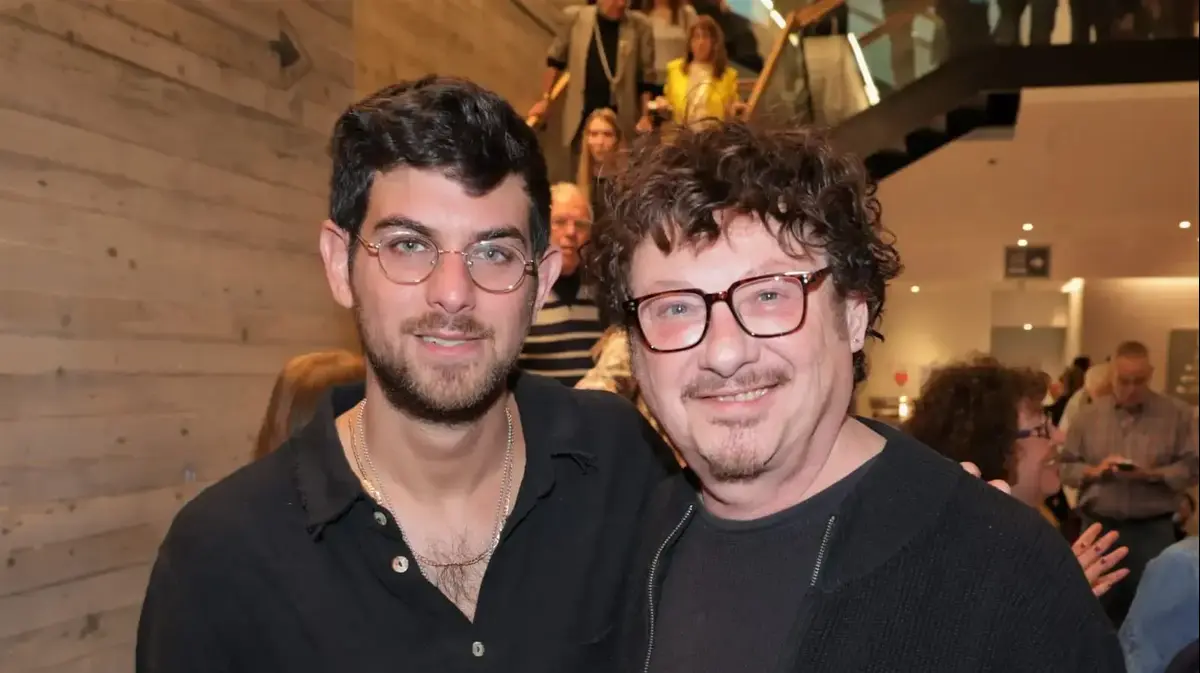"I couldn't go to my niece's one-year birthday. My brother told me that I could come by to give him the gift and a kiss at another time, of course I didn't go. He gave me a lukewarm apology. 'I already put together my family -I he explained- and sometimes things are not as one wants. You understand me.' I was speechless. My heart broke, my brother, my niece. The situation sucked."
Family relationships are not simple, there are
links that are particularly complex
.
In my 35 years of profession and my 57 years of life, I have heard numerous stories of parent-child and sibling ties that become more difficult and complex as of the arrival of new members to the family, and I will speak in this note about brothers-in-law, mothers-in-
law
/ os, sons-in-law and daughters-in-law.
And I clarify in advance, it is not about guilt, but about a succession of situations that make
intra-family relationships more complex
.
Sometimes the assembly between families is wonderful and produces an alchemy that adds and enriches, but often it brings out the most difficult aspects of the human species.
The combination of certain traits of weakness in the personality of one of the members added to envy, jealousy, resentment or pain of what is not elaborated, is managed and sets the recipe for the conflict in question, which sometimes leads to irreparable
distances
.
They are puzzles that are built, necessary and sufficient conditions for the family to become complex.
Family problems.
Illustrative photo Shutterstock.
"Who do you love more?"
"He sat me down and told me: 'You have to choose: your family treated me very badly, or defend myself or you lose me.' It is the most difficult decision I had to make in my life, I understand it but it seems very cruel to me ."
And it is, of course it is.
Human beings have enough love to be able to love here and there when it comes to family.
There is no more acute suffering than that of a child when he has to choose between his father and his mother as a result of a conflict between them.
"I love them both, I don't know what they want from me," a 9-year-old girl told me when her parents, in the middle of a War of the
Roses,
asked her to take sides with one or the other.
Human relationships are not simple, or rather they are, but the same protagonists make them complex.
I imagine a man or a woman
"pulled" by their partner
so that they choose between their family of origin or the family they built.
I lend the text to the protagonists, to those men and women afraid of setting
love limits
, because abuse can never be part of the dance of love.
-"Mom, she's my partner, you may like her more or less, but you can't treat her badly": in this case the attempt to put an end to situations of tension and violence between "her" wives.)
-"My love, I can't take that option, I love you and I choose, but my parents are part of my life and I don't negotiate with that": standing up, lovingly setting limits, is difficult but not impossible.
The words we don't say make us and our relationships sick.
What we want, what happens
"Do you understand that I miss you? Do you understand that I love you, that you are my sister and that we spend half our lives fighting? I don't care who is right, what does that matter? I care that we are two strangers and you wanna."
Words more, words less, that was the story of a 45-year-old man in
a cafe who had been waiting for many years
with his younger sister.
The result, a hug blessed with the tears of the two that was the long-awaited start of a
new stage in this relationship
.
In a world with wars, famines and children living on the streets, it is not difficult to understand how a family can be dismembered as a result of poor
communication
, secrets, ego problems and conflicts that drag on without being resolved.
The ideal:
a couple joins in marriage or cohabitation and adds all the beauty that each family has to give separately.
The complex is worked as a team so that each one contributes the best they have to find solutions for the common good.
What often happens:
misunderstandings are the order of the day.
Hidden fears of losing position/privileges/"power" lead to decisions that damage ties, which are far from adding up.
In love there are no conditions, only agreements, says Schujman.
Photo Shutterstock.
No, walking away is not a "proof of love"
Erich Fromm said: "Love is the active concern for life and the growth of what we love. When such active concern is missing, there is no love. The essence of love is to "work" for something and "make it grow.
"
Love and work are inseparable. You love what you work for, and you work for what you love."
That is, if I love someone I should feel a genuine desire for
the other person to be happy
.
A genuine desire and not the circumstantial phrases of "I want the best for you" "your happiness is my happiness" and blah, blah, blah.
In a couple,
the egos have to be very balanced
, the self-love very planted so that they can GROW together.
And this implies bearing that
love is shared
, that the happiness of the person we love is not sustained only in what we can give them, but in each of the aspects of their lives outside the scope of the couple.
Asking the partner for solidarity with the pain inflicted by a member of the family to the point of
promoting a distance is a selfish act
that is far from love as proposed by Fromm.
The decision to distance oneself from those who caused the supposed damage "is a proof of love" that puts a complex pressure on personalities with difficulties in setting limits.
Suffering is generated
, and suffering should not be on the menu of healthy relationships.
At this point and to understand this phenomenon we must also situate jealousy
,
which is the result of the perception of a threatening experience, a shadow in the relationship regarding territoriality and "power".
They may be generated by specific actions on the part of the other person or by their own insecurities that are triggered when some stimulus or event is decoded as dangerous.
Let's think of the ability to love as a highway: the love of a couple goes one way, the love of a child for another, the love of a brother or sister for a third.
And so with every sphere of people's lives.
Now imagine
an accident
in one of the lanes.
The traffic diverts and mixes, it delays, it slows down, it stops.
This happens in families when each person's spaces cannot be sustained and they collapse.
There is a traffic agent who says "you pass, you wait".
All can not if there is less space.
And people find themselves in the position of making
false choices
, which have consequences.
In love there are no conditions
, yes agreements, yes contracts, yes loyalties, on the scaffolding of good communication and knowing that love should never subtract.
I want to clarify:
I am not talking about the fault
of any of the protagonists, I am only describing situations that are frequent in the consultation.
And they generate a lot of pain in those who are convinced that they have to choose, in those who (mothers, fathers and siblings) feel very powerless for not being able to be more than spectators of a script that is their own and alien at the same time.
Now, the question that each reader who feels identified should be asking themselves at this moment is: "It happens to me just as you say, what do I do?"
Toolbox
Here is a small toolbox so that perhaps something different happens in those family novels where pain and resentment take over.
✓
Speak
from the heart .
Leaving the anger aside, leaving the story inclusive.
Speak from the heart and with the heart in hand.
Without accusing.
Without the pointing finger.
To speak from what we feel, because surely in each of these stories there is a lot of unresolved pain.
And maybe a fair word can help unlock that pain.
✓
Do not
accumulate grudges from silence .
Trying to go back in time to understand and disarm the tangle of misunderstandings.
✓
Do not give up the possibility of dialogue
with sister-in-law, mother-in-law or whoever is the main protagonist of the conflict.
Many times the anger is fueled over time and a good talk can help lower the persecution fantasies on both sides.
I go back to what I often say as a philosophy, life is long but not that long and sustaining discomfort is very expensive emotionally and physically.
We have the word left
, let's make loving use of it.
It's worth it, believe me it's worth it, maybe it will turn out well and if not at least we will have tried.
*Alejandro Schujman is a psychologist specializing in families. Author of I don't run away, I just fly: The art of letting go of children, Ni-Ni Generation, It's not because I said so and Tools for parents He directs, coordinates and supervises the @redasistencialpsi.
***
These columns by Alejandro Schujman may also interest you:
➪Fights between siblings in adulthood: 5 reasons for conflict and how to improve the relationship
➪What to do when siblings are absent in the hard task of being the parents of our parents
➪How to face the difficult task of being parents of our parents
➪Can "toxic" people change?
***
➪Do you have any questions about health and well-being that you would like us to address in section notes?
Enter the Clarín Help Center by clicking here, enter
Message to the newsroom
and then
Questions to Buena Vida
.
Write us your query and send.
Ready!
look too
"Digital emotions": what they are and how to identify them to control the impact they have on your life
Mario Alonso Puig provides 5 keys to "change the chip" and learn to manage emotions



/cloudfront-eu-central-1.images.arcpublishing.com/prisa/Z2ST4NFTPBEKPBPT2QILJYIJYY.jpg)











